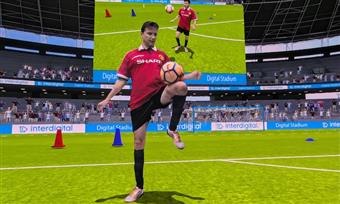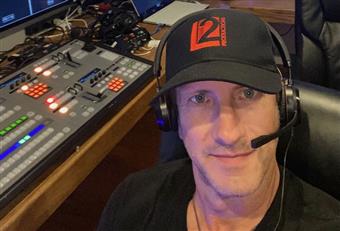 SVG All-Stars: Catherine Chalfant, Manager, Remote Operations, ESPNThe Ole Miss alum is an operational force behind ESPN's extensive college-football catalogBy Brandon Costa, Director of Digital
SVG All-Stars: Catherine Chalfant, Manager, Remote Operations, ESPNThe Ole Miss alum is an operational force behind ESPN's extensive college-football catalogBy Brandon Costa, Director of Digital Tuesday, October 28, 2025 - 7:00 am
Print This Story | Subscribe
Story Highlights
As the pace of change in sports production shows no signs of slowing, a new class of innovators and decision-makers is shaping the industry's future. Now in its second season, our SVG All-Stars series spotlights the rising leaders driving that transformation, offering a look at their career paths, leadership philosophies, creative and technological contributions, and vision for what comes next. Each conversation introduces you to the people redefining the workflows, culture, and possibilities of live sports production.
The calendar is ready to flip to November, and that means college football is about to get serious. With the expanded College Football Playoff looming, ESPN's many crews are ready to deliver some high-stakes matchups.
Behind the scenes, one of the newest operational leaders guiding this nationwide feast of football is Catherine Chalfant, manager, remote operations, ESPN.
The nine-year veteran of the network is in her first year as one of the key operations executives overseeing ESPN's college-football team. The broadcaster will deliver more than 1,000 games this season across its family of networks: ABC, ESPN, ESPN2, ESPNU, SEC Network, ACC Network, and ESPN+.
Before joining the college-football effort, Chalfant played an integral role in ESPN's coverage of college basketball, including the NCAA Women's Final Four during its most significant years of growth. Since starting as a remote-operations intern in 2016, she has built a reputation for precision, preparation, and a leadership philosophy grounded in consistency and excellence.
In this edition of SVG All-Stars, Chalfant discusses the national-championship mindset that drives her team, the growing importance of university-based production-control rooms to the ESPN ecosystem, and the lessons learned from nearly a decade inside the broadcaster's live-production engine.
What are the key responsibilities of your current role?
I currently serve as the manager of college football, the Women's College World Series, and the National Collegiate Beach Volleyball Championship.
In college football, I have the privilege of working alongside a fantastic management team and a deep bench of talented coordinators. College football is a seven-day-a-week operation. My role is to ensure our teams in the field are fully prepared for success each weekend and meeting the high standards that our viewers and partners expect, while also planning weeks ahead and coordinating details for the upcoming College Football Playoff and National Championship.
Catherine Chalfant working a game between Nebraska and Wisconsin in November 2016, her first college-football broadcast as an ESPN intern. She had just accepted a full-time coordinator position with ESPN the day before. (Photos: ESPN)
What is one key industry trend that you believe is having a major impact on your organization right now?
One trend that is having a significant impact - and is often understated - is the growing value and capability of school-based production-control rooms at universities across the country. Many of these facilities are now state of the art, rivaling professional broadcast environments in both technology and production quality.
Thanks to our partnerships with schools across multiple conferences, we're able to produce more live content for our networks than ever before. These control rooms not only enhance our programming volume, particularly in the collegiate-sport space, but also serve as exceptional training grounds for the next generation in our industry.
I'm speaking from experience: I got my start in a university control room at Ole Miss, and those early reps were foundational to where I am today in my career. The exposure, responsibility, and hands-on learning that happens in those environments can't be overstated. It's a pipeline that benefits both the schools and the broader industry, and it's only becoming more vital as we scale production and evolve our content strategies.
Chalfant (far right) at the 2021 NCAA Women's Basketball National Championship Game bubble at the Alamodome in San Antonio, TX, with (from left) Lindsay (Hayden) Elliott, Carson Kenny, and David Quintanilla
What is one core philosophy you try to live by when managing your team/operation?
Treat every day like it's the national championship. This mindset creates a culture on our team where excellence isn't reserved for big moments; it's expected in the day-to-day. For me as a leader, that means constantly asking: Are we preparing our team to the highest level we can? Are our teams in the field set up for success? Does our execution reflect the energy, precision, and pride we want our team to bring to the biggest stage?
We build season-long systems that support excellence: clear communication, quality execution, and a shared team commitment and vision of being the best at what we do every single day.
What is your favorite event(s) you've ever worked?
Three events stand out as true pillars in my career.
One of the most memorable experiences has been working on multiple Armed Forces Classic basketball games held on U.S. Air Force and Navy bases. These productions were incredibly special, not only because of the logistical challenges of broadcasting from unique and remote locations but because of the opportunity to connect directly with the men and women who selflessly serve our country. Combining the power of college basketball with the privilege of honoring our military made those events deeply meaningful. It was a powerfu































































